Brooklyn's Pandemic-Born Mutual Aid Organizations Continue Their Work
Two years ago, as schools, stores, offices, and community spaces closed their doors indefinitely, thousands of Brooklynites found themselves suddenly thrust into dire straits.

East Brooklyn Mutual Aid unloads boxes of food. Now partnered with farms who provide fresh produce each week, the organization is working to expand well beyond their initial goal of delivering food and meals. Photo via Kelvin Taitt/East Brooklyn Mutual Aid
Two years ago, as schools, stores, offices, and community spaces closed their doors indefinitely, thousands of Brooklynites found themselves suddenly thrust into dire straits.
Many were left without a source of income — permanently laid off or told their shifts were canceled until further notice. Caretakers scrambled to find a safe place for children, parents, or other dependents, and protective equipment was both expensive and hard to find.
Help was slow to materialize — and in some cases, never did — as local and federal government agencies and nonprofits tried to deal with the sudden spike in demand for money and assistance.
Almost as quickly as the world changed, though, everyday New Yorkers were stepping up to fill the gap, banding together to form informal, community-based mutual aid groups to make use of their joint resources and take care of each other.
While the pandemic and the deep need it exacerbated in New York City has stretched on, those groups have grown and changed, determined not to leave anyone behind.
The early days
On March 12, 2020, Kevin LaCherra, a coordinator with what’s become North Brooklyn Mutual Aid, posted in a Facebook group asking if anyone had volunteer opportunities. He and his neighbors were starting to realize how serious the coming days and weeks would be, and he wanted to help.
In short order, he and another community member, Danielle Franco, put together a Google spreadsheet where locals could type in what they needed, and others who had the resources could volunteer to help them out.
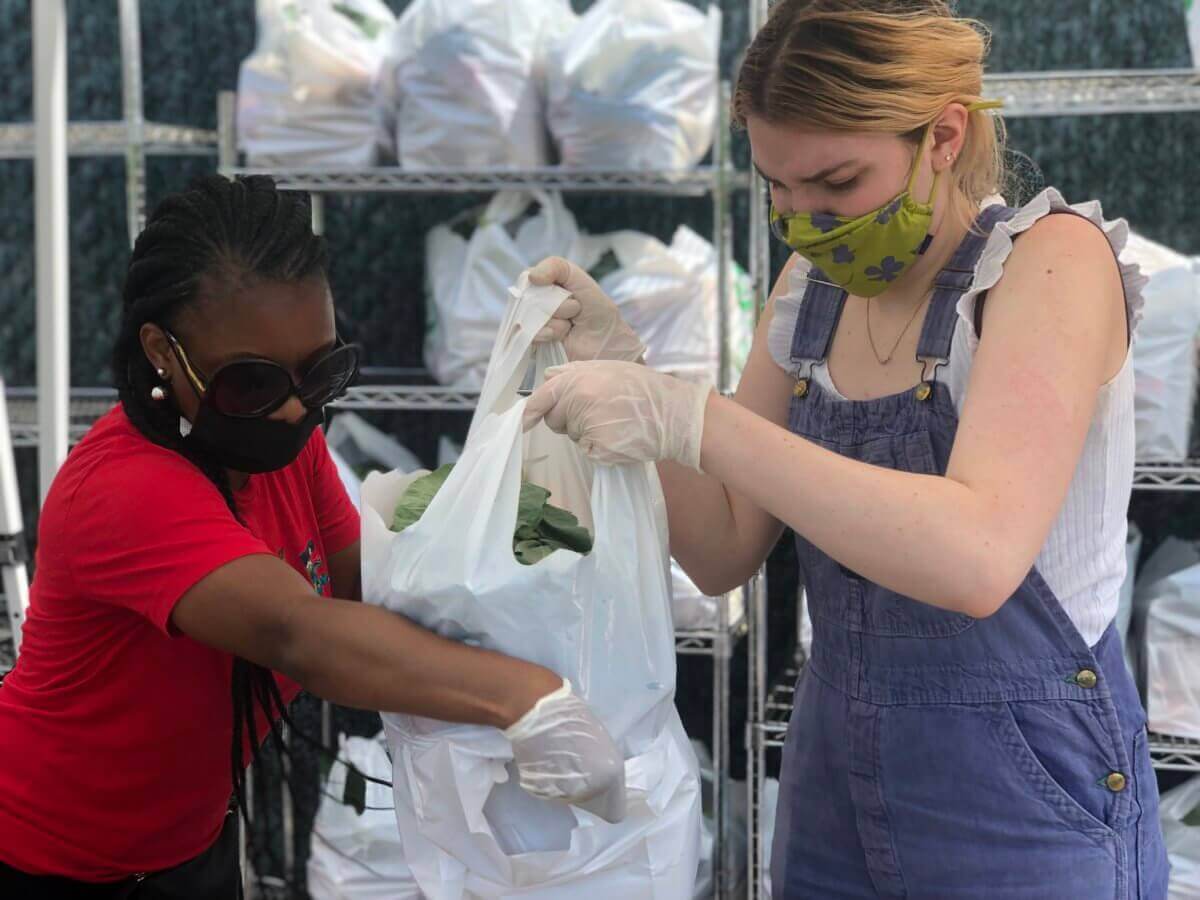
At the same time, similar efforts were springing up around the neighborhood — people were asking for, and offering, help in Facebook groups and Slack channels, and one group was even pinning up posters with a phone number and an email address for people to contact if they needed help.
“All of us kind of connected with each other, we were like, ‘Well, we don’t want to duplicate efforts, let’s bring this together as something, let’s make this something,’” LaCherra said. “So we called it North Brooklyn Mutual Aid.”
In the early days, it was a “lifeline” for the neighborhood, he said. People needed money for groceries or, sometimes, someone to take some money and go to the grocery store, or the pharmacy, on their behalf. At that point, most volunteers were using their own money or getting reimbursed when they dropped off what was needed.
Mutual aid groups across the city have similar origin stories. Kelvin Taitt, co-founder of East Brooklyn Mutual Aid, was newly recovered from COVID himself last spring and wanted to do something to help his community. He and his co-founder decided they would start out by raising money to buy and deliver groceries to their neighbors.
They partnered with Crown Heights Mutual Aid, who shared a list of people who needed deliveries in Ocean Hill and Brownsville, the group’s initial home, and some money to get them started.
“We started with, you know, 10 households a day, three days a week,” Taitt said. “And increased that to 30, from 30 to 60 households. Over time, our peak was 150 households a week that we were delivering to.”
A local church served as a makeshift warehouse, and when another food distribution group, the Brooklyn Packers, needed a new temporary home, they entered a partnership with East Brooklyn Mutual Aid — they opened up their space and the Packers started sharing the food they sourced, so the group could offer up significantly more fresh produce to the community.
Needs get more serious
Just a week into North Brooklyn Mutual Aid’s existence, LaCherra got a call from now-state Assembly candidate Samy Nemir-Olivares. Olivares, who was working with Bushwick Mutual Aid, had just gotten off the phone with a nurse at Wyckoff Heights Medical Center. The nursing staff was in desperate need of masks and personal protective equipment, and wanted to know if Bushwick Mutual Aid had any to spare.
“I remember just my blood ran cold,” LaCherra said. “At the time … we were certainly helping, but I think it was absolutely the sense that at any moment, the cavalry is going to come over the hill. Any moment, the federal government, the state government, the city government, the local government, is going to do something.”
He reached out to Woodhull Hospital, who said they also needed masks and PPE. So North Brooklyn Mutual Aid got to work, sourcing masks and reaching out to manufacturers and businesses in the North Brooklyn Industrial Business Zone who had pivoted to creating face shields. The work was nonstop, but they ended up sending face shields for every single employee at Woodhull.
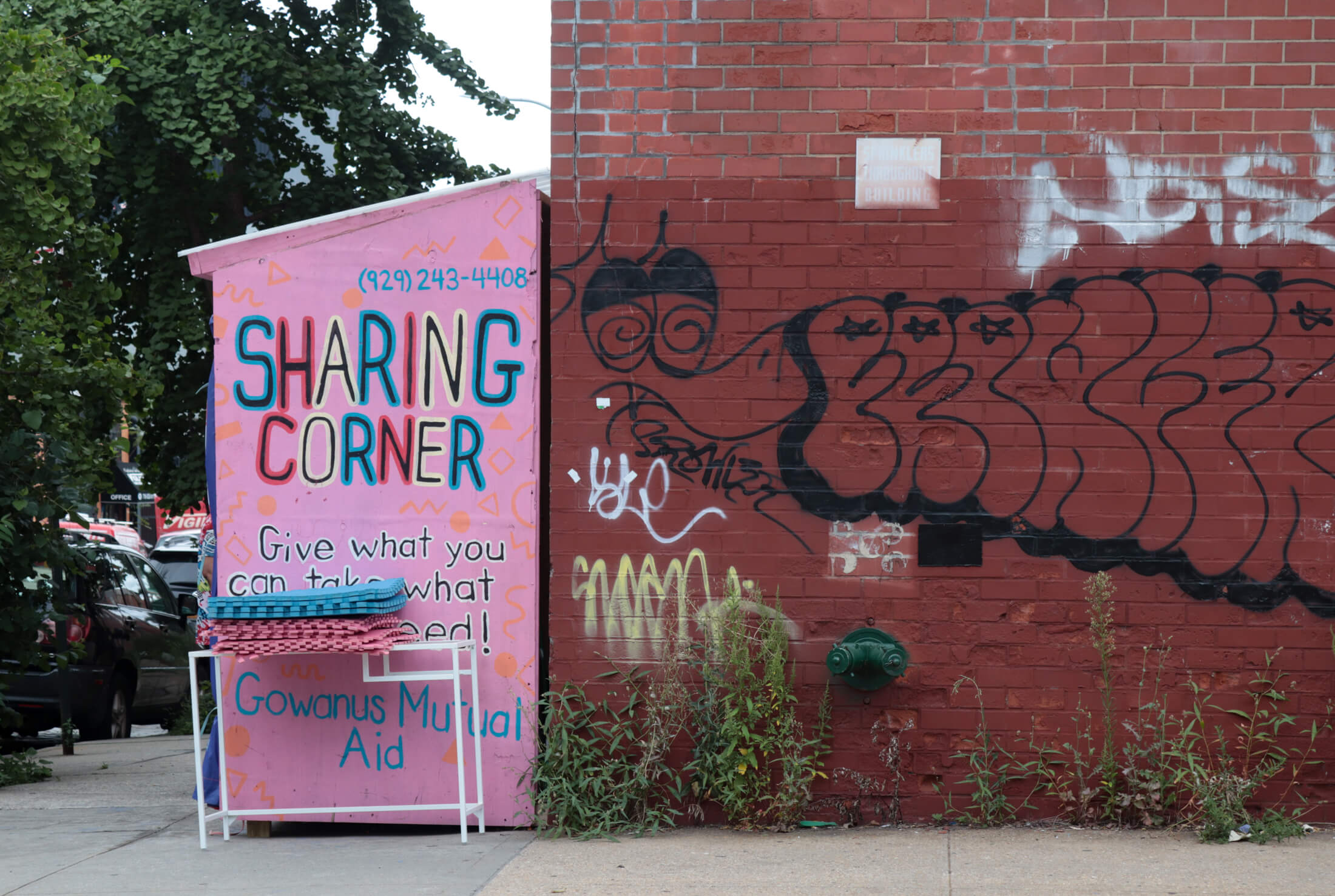
It was horrifying, it was sobering, it was beautiful, because regular people were just rising to the occasion,” LaCherra said. “Were stepping in. It’s beautiful, it’s sobering, it’s also criminal on the part of the government that people had to do this at all, and that people are still having to do this.”
Further south, things were also escalating quickly for the organizers of South Brooklyn Mutual Aid, said Whitney Hu, an organizer with the group.
“I had a lot of hard and traumatic calls with mothers crying,” she said. “I had a mother trying to set up a payment plan for formula.”
She realized quickly that their initial model, running out to purchase food and being reimbursed by those who could afford it and fundraising for those who couldn’t, wasn’t going to work. Undocumented people in the neighborhood were completely left behind, she said, unable even before the pandemic to rely on assistance like food stamps, and the city’s response was slow and inadequate. Hu remembered one woman who had been thrilled to receive fresh fruit in a South Brooklyn Mutual Aid delivery, because she was a vegetarian and had been getting deliveries of applesauce and chips from the city.
The organization reached out to grocery stores and managed to get some to agree to sell food as close to the wholesale price as possible as they fundraised to send out as many free grocery boxes as possible. Tens of thousands of dollars fed about 600 families per week, including diapers and formula for those who needed it.
Things were slapdash, but they worked — after just one weekend clogging up Sunset Park’s streets and storing perishables in a nearby bodega’s refrigerator while they boxed up food deliveries, the team knew they had to find an alternative. They managed to sublease a space at the Brooklyn Army Terminal and Hu convinced a friend’s company to lend out their cargo truck to make deliveries easier. Hu joked that she became the “shortest delivery woman in south Brooklyn” as she hauled boxes up and down apartment stairs. Delivering the food was really important to the group, she said, rather than forcing people to stand in long distribution lines or prove the size of their families and thus, their needs.
Mutual aid moving forward
Things have changed dramatically in the last two years, but every mutual aid organizer seems to agree on one thing: the needs of their neighbors have not disappeared. The pandemic exacerbated existing inequalities, it didn’t create new ones. Mutual aid groups are figuring out what their long-term missions are as funding dries up and volunteers spend more time back at work.
Myles Smutney founded the Free Store Project in October 2020, building a collection of neighborhood-based “storefronts” in Brooklyn and Manhattan where people could donate food, clothes, toys and books, or whatever else they wanted to give away, and their neighbors could stop by to take what they needed or wanted.
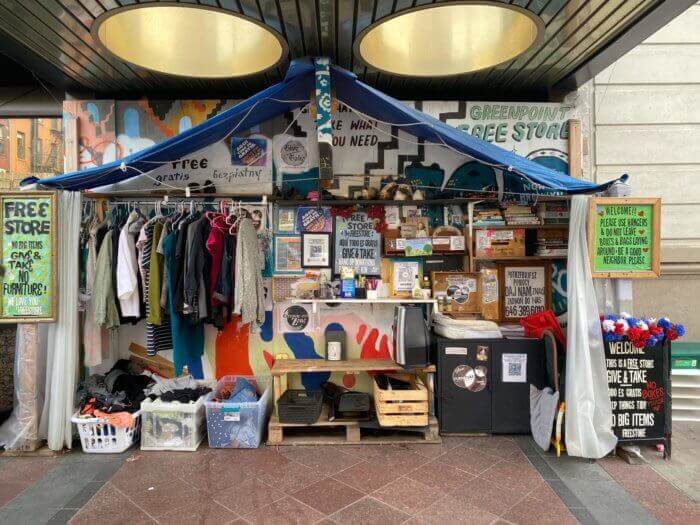
Photo via The Free Store Project
“The response is still really strong, there’s still people who love it, there’s still people who engage with it,” Smutney said. “But in terms of building things, and doing the grunt work, that’s where we’re having a problem.”
She realized quickly that the project was going to need a continuity plan, so in May of last year, they applied to become a registered nonprofit. Two months ago, the application was approved. Plans are still being laid but, eventually, the designation will allow Smutney to hire and pay the people who keep the Free Store Project running.
“Then we can hire people, too, so we’re not, like, competing with them being able to feed themselves by working for us for a day when they could be working for something else, or someone else,” she said.
Things are changing at East Brooklyn Mutual Aid, too. They still work closely with the Christian Cultural Center and deliver food to around 100 households per week, from New Lots to Ocean Hill to Flatlands and Canarsie, Taitt said. Starting next month, they’ll be taking trips out to two BIPOC-owned farms, who have been delivering fresh produce to the group to use in their food deliveries for the last two years, to spend a full day helping out and learning about the farm and growing food.
Taitt’s goal, though, is to launch a series of decentralized “food hubs” in each neighborhood they serve, which would combine processing and food distribution, culinary education, a grocery store, and more.
“Each [hub] will have their own identity that will replicate the community in which it will live, and it should be run by organizations and stakeholders that live and work there,” he said. “It’s an economic development strategy where we can develop economies in each of these neighborhoods.”
The hubs will also provide an on-the-ground, ready-to-go network of resources if the community ever faces such a large crisis again. Community organizers know their neighbors and their needs better than any outside agency could, he said, so they know that one neighbor may be on her own and in need of not just a grocery delivery, but someone to prepare a meal with her newly-delivered ingredients.
“From a community, neighborhood standpoint, a lot of us could make decisions quickly and get to so much more people faster than it took for people to register for city resources and wait for the city to serve so many people,” Taitt said. “We’re looking to create spaces that showcase the beauties of our community and how, with the right resources and the right support, how well we can thrive and be self-reliant.”
South Brooklyn Mutual Aid is coming to terms with the fact that it’s time to slow down, Hu said. They’ve been receiving “fresh, beautiful” produce from Driscoll through a city program, but that money will be gone by the end of April, and the organization struggled to fund their free grocery boxes through February. The first few months were a “hot mess,” she said, but people were willing and able to offer up resources like storage space, refrigerators, and vehicles. Now, those things are getting harder to come by.
“If you asked me to do today what I did two years ago, I could not do it,” Hu said. “That was by the grace of God, and whatever gods are out there.”
In the next few months, they’ll be looking to return to their roots — maintaining community fridges, running diaper distributions, and making spaces for their community, who have been through so much, to have a little fun.
Hu and her fellow organizers have community organizations they’re comfortable with and trust who can step in to help the neighbors with more needs than South Brooklyn Mutual Aid will be able to provide for.
She hopes the continued work of the city’s mutual aid groups will make a real impact, and that people will keep learning that it’s OK to lean on each other, rather than feeling too prideful to ask for help or to be judgemental of people who need assistance.
She is also, ultimately, disappointed that everyday people have had to spend so much time and money covering each other’s most basic needs for more than two years now. The work South Brooklyn Mutual Aid has been doing is really rapid-response disaster help, she said.
“This is not a feel-good story,” Hu said. “We’ve been doing rapid response, we’ve been doing food relief, we’re doing things our government should have been doing.”
Editor’s note: A version of this story originally ran in Brooklyn Paper. Click here to see the original story.
Related Stories
- Brooklyn Residents Found Help From Their Neighbors During Pandemic Year
- Locals Fight ‘Sickening’ Private Equity-Backed Landlord Moving Into Greenpoint, Williamsburg
- Here Are 7 Brooklyn Organizations Raising Funds and Doing Good Across the Borough
Email tips@brownstoner.com with further comments, questions or tips. Follow Brownstoner on Twitter and Instagram, and like us on Facebook.

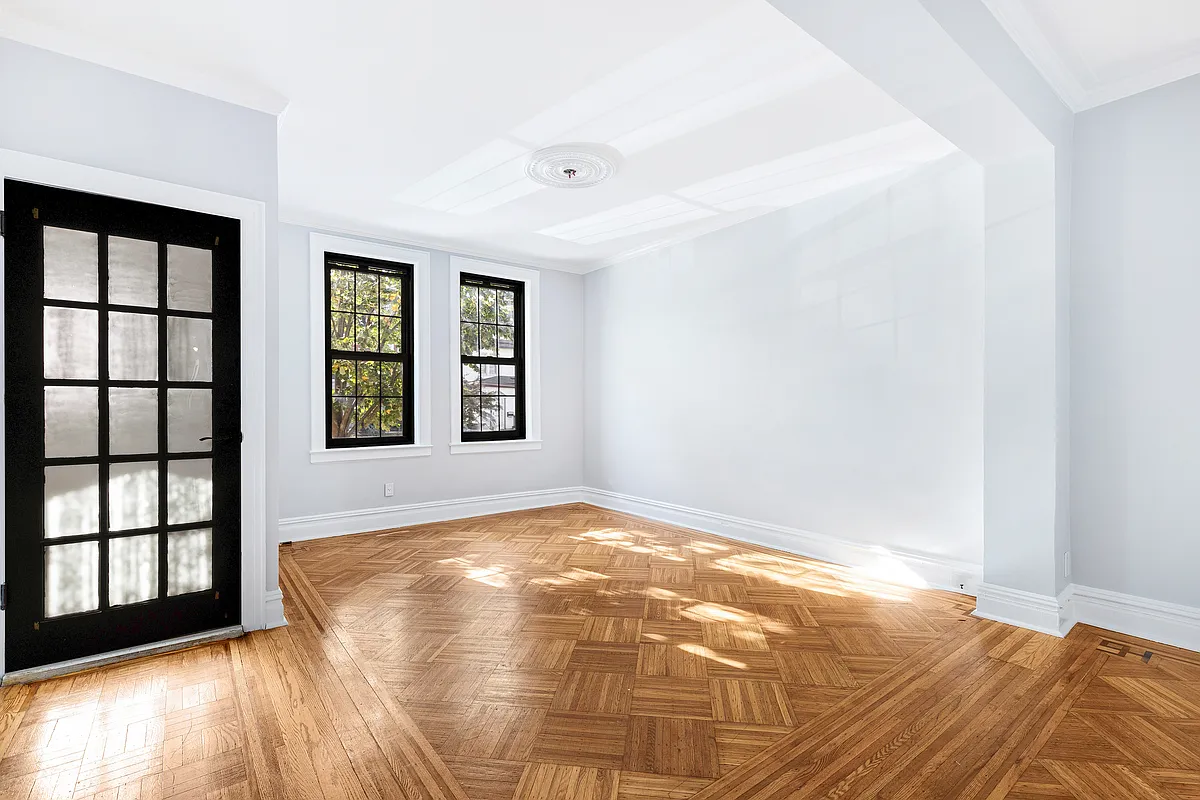
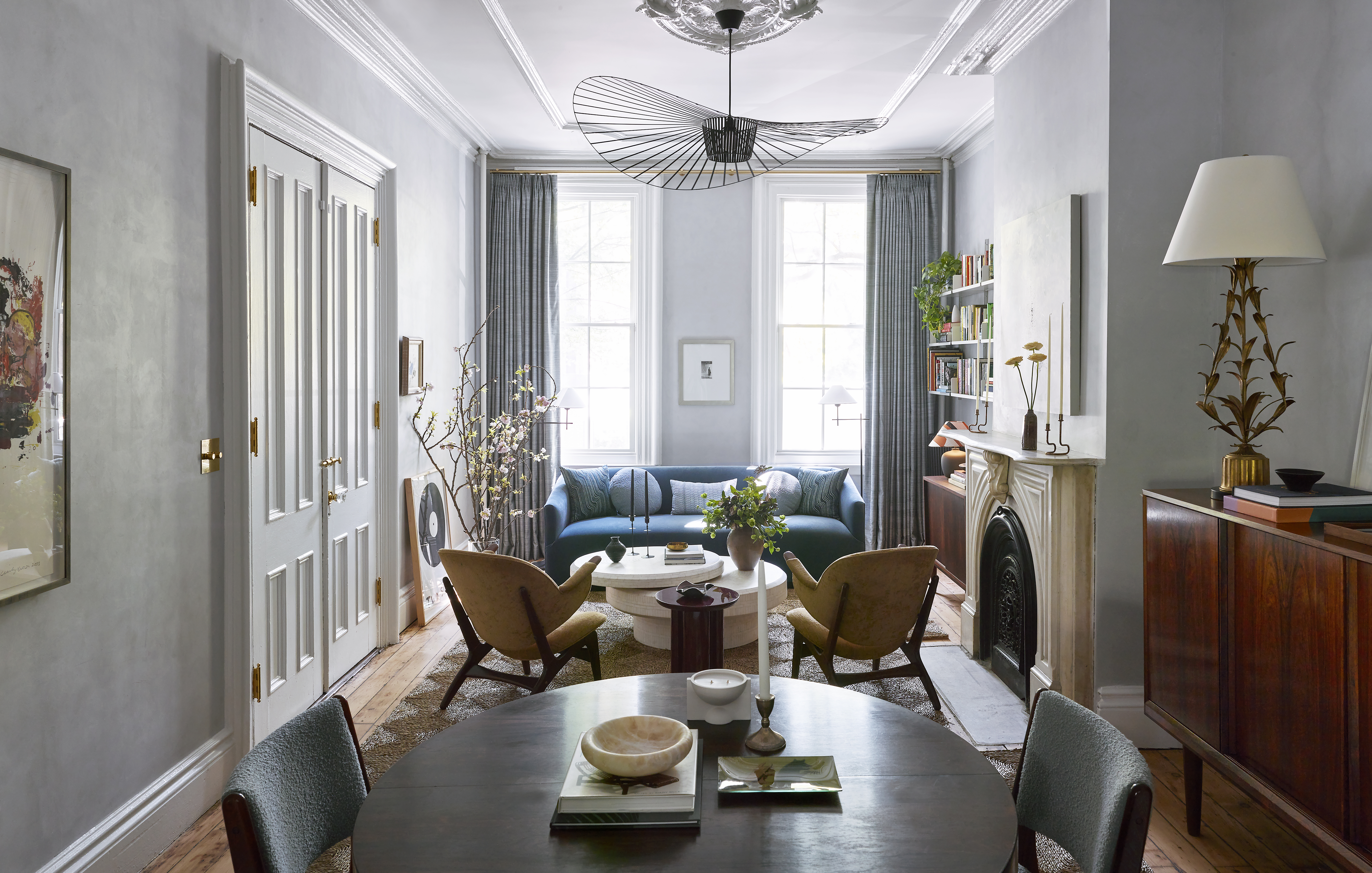
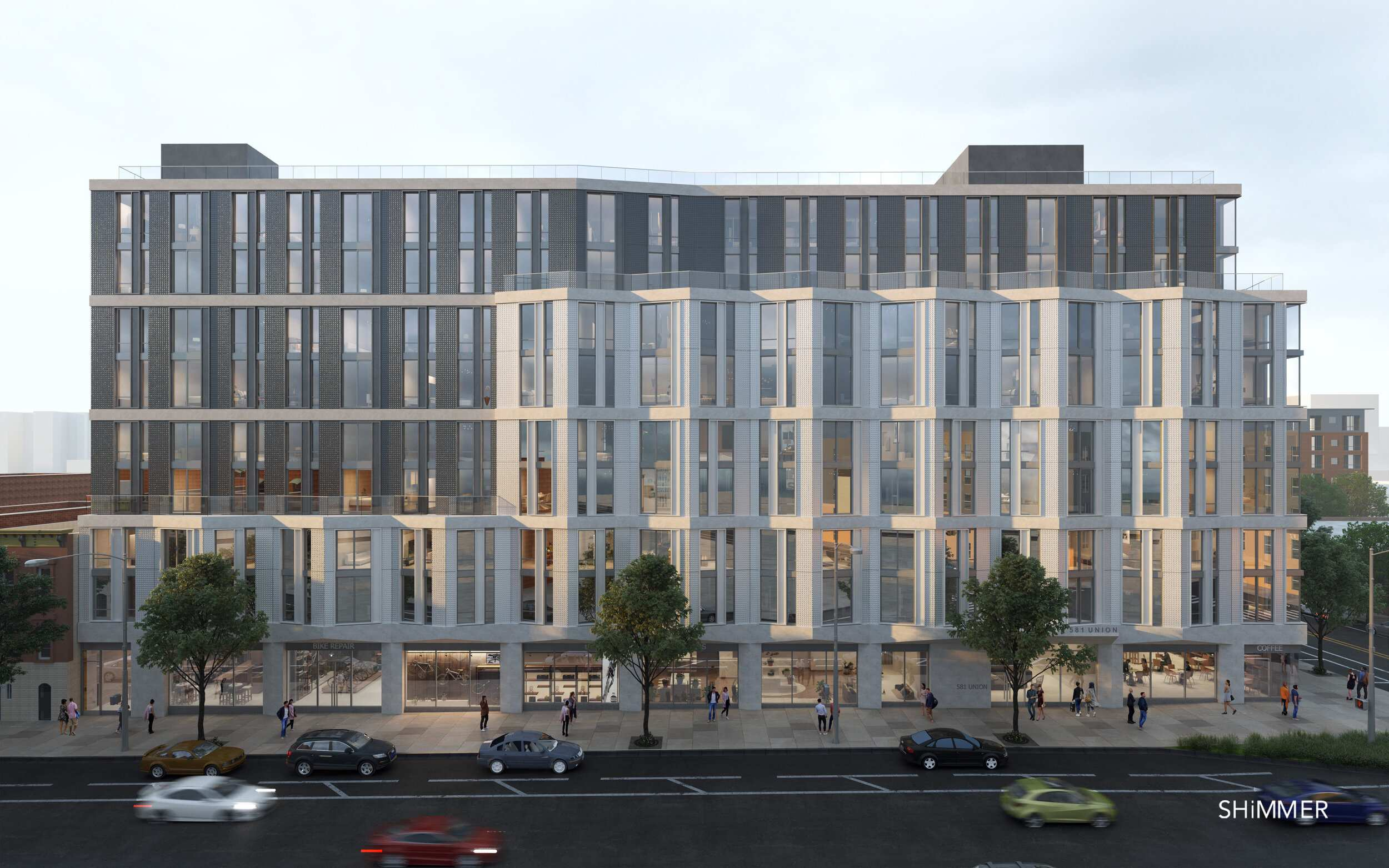
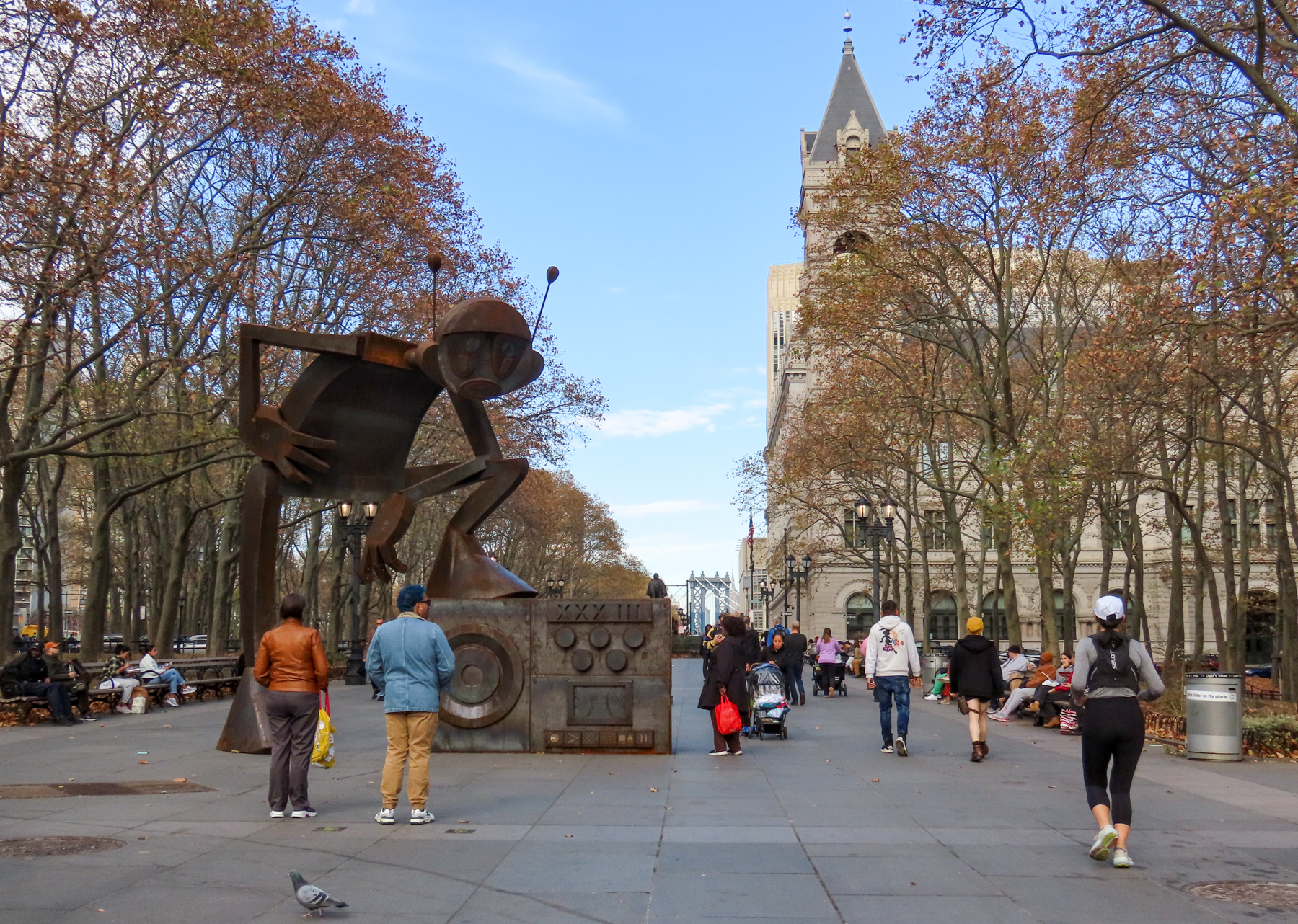




What's Your Take? Leave a Comment